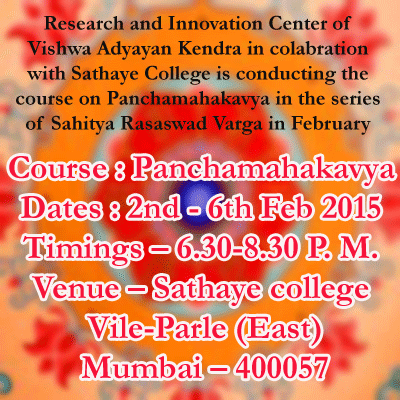HINDU ECONOMY- PAST, RPESENT & FUTURE
Keynote address by Swami Vigyananand ji
He further added that our perception of Vasudhaiv Kutumbakam also should be imbibed with due care (be taken in proper perspective), as economic prosperity is the basis for sustaining civilization. Swami Vigyananand, alumni of IIT (Kharagpur), PhD. in Eastern Philosophy is the Chief Founder of World Hindu Economy Forum which aims at prosperous society through generation & sharing of wealth.
While deliberating on the subject HINDU ECONOMY-PAST,PRESENT & FUTURE, Swamiji cited several references not only from Mahabharat, Shrutis, Ramayan, Koutilya's Arthashastra but also those by Western thinkers of various times. He talked of philosophy of Kautilya Dharmasya moolam arthah & cited Lord macaulay that wealth of Bharat i.e. India was the capital for industrial revolution.
He reiterated that it is an unfounded argument about Bharat to say that wealth making is a sin, as world history notes. Ancient India indicates that only those (an individual or a society) can aspire for Dharma, who have accumulated wealth. He elaborated that heavy taxation as much as 90% was levied on natives during the times Mohommedan & British rule and the latter did the so called improvement, like roads & railways, only to suit their loot of Bharat which, according to a conservative estimate is 400x 10 raised to 9 (billion) Dollars, and actually led to frequent famines, consequently causing rise of poor morale in the natives.
With facts & figures he mentioned that in comparison to ancient India's 35% contribution to world's GDP, today it is mere 3-5% despite having world's 16% population. This, according to him, was attributed to the then progressive policies of giving due scope to farmers and businessmen and certain other facts, like agriculture that did not depend solely on rain but many dams and reservoirs built in villages. He quoted Galbraith's remark that the Jawaharlal Nehru was like a last British who ruled India and in the quick tour to eras of Indira Gandhi, Narsimha Rao & Atal Behari Vajpayee, he informed the audience that with destruction of electronic, chemical, textile & auto industries since Mrs. Sonia Gandhi's rule, India today has imports vs export deficit of 188 Billion US Dollars.
The audience was taken a back on knowing from Swamiji that it was Bipin Chandra Pal from the famous trio of Lal-Bal-Pal of pre-independence India, who had then envisioned the serious menace from pan-Islamism & pan-Mangolism, more than 60 years back, and that Pakistan poses like a mere borrowed knife of China to murder India.
While making a point that tax on industry should be carefully worked out based on the cost, demand and type of technology of the product, he pointed out the fact that unlike Srilanka, Indian entrepreneur mostly gets strength from its society, nothing (much) from the State. Hence, the smartness of Hindu businessmen (especially intelligence of assessing market pulse) should be motivated through legitimate taxation not exceeding 1/6 th of income, aside from soft loans to farmers @1% or so; as the basic fact remains that any profession will progress only if it sees profit. While cautioning that China wants us to be traders rather than manufacturers and that many 'Made in India' goods are faked in China, he called for emphasis, like Germany and China, on manufacturing industry (rather than software or service), investment in world class educational institutions; and R &D in Science & Technology. He suggested coordinated efforts through business clubs/forums to care investors, technocrats, traders to mutually share experiences, boost credit availability and integrated market access. Concluding his hour long speech, he emphatically argued that these strategies under given conditions would result in prosperity and growth of wealth of Hindu society. with generation and sharing of wealth.
Before his key note address, he gave away prizes to the winners of VAK's essay competition cosponsored by 'Free Press Journal', on "Sustainable Economic Model for Society" a subject slightly complicated for the undergraduates. Surprisingly, a student from Ram Ratna Mandir Vidyalay, Bhayendar (Thane) shared a prize with IITians. Ms. Chaitali Joshi , IIT Mumbai won the 1st prize while 2nd prize was won by Mr. Abhis Dev IIT Mumbai. Master Yash Marwah of Ram Ratna Vidya Mandir received the third prize. The well attended function by cross section of Mumbai's elite, was presided over by Shri Vijay Agrawal, eminent industrialist. He acknowledged Swamiji's endorsement for the care of entrepreneurs, especially of limiting taxation to them upto 1/6 th of their income. He also remarked that unless we have sensible polity, things won't improve.
Earlier, at the commencement of the function, Chairman of VAK, Shri Sanjay Kelapure informed audience about present VAK activities in his welcome speech about the formation of Jewish-Hindu Forum of India in January 2012, and Hindu-Jewish forum of USA in July 2012 with active support from our sister organization ICCS International center for cultural studies in USA. Research and innovation center under the leadership of Dr. Asawari Bapat was inaugurated on 1st August 2012 and various activities of research have started under the banner. VAK has initiated activities in Indonesia under the leadership of Advocatet Rajesh Mudholkar and he has involved many local natives and Member of Parliament. Research work is completed in Indonesia about "Hinduism since 3rd century" by native Ms Surpi Aryadharma is ready for publication. Entrepreneur Education in 6 villages has started & a Library has also been set up. The process of the formation of Jawa- Hindu University has been initiated with the help of local Institution and Member of Parliament at both places of Bali and Jawa region. Shri Vidyadhar Phadke General Secretary of VAK Mumbai welcomed Swami Vigyananand. Master of Ceremony, Mr. Narasimhan, conducted the program with elan. Programmed was over with vote of thanks by Shri Pravin Pai, programme co-ordinator, and Vedik prayer by Shri Ravi Bhide.
